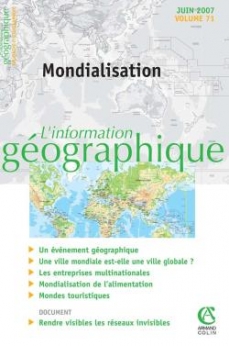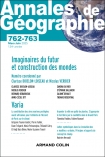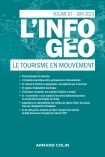
L'information géographique - Vol. 71 (2/2007)
Pour acheter ce numéro, contactez-nous
Recevez les numéros de l'année en cours et accédez à l'intégralité des articles en ligne.
La mondialisation est, fondamentalement, un événement géographique, c’est-à-dire un événement historique qui porte sur l’espace, ici l’émergence d’un espace pertinent d’échelle mondiale. La mondialisation est un long processus dont nous pouvons dater le commencement au moment de la dispersion des humains sur la planète, il y a un peu moins de 100 000 ans. Ce qui se joue dans la phase actuelle est la construction d’une société de plein exercice à l’échelle mondiale, incluant une fonction politique effective. On peut modéliser l’état de la mondialité en s’appuyant sur quatre modèles et leurs interactions : celui de l’écart entre communautés, celui du champ de force interétatique, celui du réseau d’échanges et celui d’une société-Monde. La mondialisation modifie l’équilibre entre ces modèles et entre les niveaux d’échelle où chacun d’entre eux opère, ce qui signifie aussi qu’elle change les relations entre métriques, notamment entre territoires et réseaux. La mondialisation ne peut en aucun cas être comprise comme un processus de négation des lieux. Si l’« invention du Monde » tend à réduire les disparités entre les différents points de la planète habitée, elle a pour effet de donner un sens inédit à la singularité des lieux dans un ensemble totalement interconnecté. C’est parmi d’autres, l’un des enjeux majeurs de la mondialisation, enjeu rendu possible par le fait que le devenir du Monde n’est nullement prédéterminé. Une des caractéristiques de cet événement est, en effet, qu’il est pensé en même temps qu’il est vécu. C’est dire que la notion d’acteur, et notamment d’acteur spatial, n’a probablement jamais eu autant de pertinence.
Globalisation is basically a geographical event, in other words a historical event concerning space, actually the emergence of a world-scale relevant space. Globalisation is a long-term process, whose beginning can be placed when the humans started to scatter throughout the Earth’s surface, soon after 100,000 BP. What is at stake in the present stage is the construction of a full-fledge society worldwide, including an efficient political function. The present level of globalness can be represented by four models and their interactions : inter-communal remoteness, interstate field of forces, exchange networks and World-society. As a result of globalisation, the balance between these models and the scale at which each one operates are being modified. Moreover, relationships between metrics are changed, too, namely those existing between territories and networks. However, globalisation can by no means be seen as a place-destroying process. While, on one hand, the “invention of the World” potentially reduces disparities between the various spots of the inhabited space, we can, on the other hand, observe the new, unique significance of singular places within a totally connected environment. The emerging role of places is a major issue of globalisation, whose future remains largely open. As a matter of fact, one peculiarity of globalisation is that it is a simultaneously experienced and reflected event. This is the reason why the concept of actor, and specially of spatial actor, has probably never been as relevant as it is today. Globalisation is basically a geographical event, in other words a historical event concerning space, actually the emergence of a world-scale relevant space. Globalisation is a long-term process, whose beginning can be placed when the humans started to scatter throughout the Earth’s surface, soon after 100,000 BP. What is at stake in the present stage is the construction of a full-fledge society worldwide, including an efficient political function. The present level of globalness can be represented by four models and their interactions : inter-communal remoteness, interstate field of forces, exchange networks and World-society. As a result of globalisation, the balance between these models and the scale at which each one operates are being modified. Moreover, relationships between metrics are changed, too, namely those existing between territories and networks. However, globalisation can by no means be seen as a place-destroying process. While, on one hand, the “invention of the World” potentially reduces disparities between the various spots of the inhabited space, we can, on the other hand, observe the new, unique significance of singular places within a totally connected environment. The emerging role of places is a major issue of globalisation, whose future remains largely open. As a matter of fact, one peculiarity of globalisation is that it is a simultaneously experienced and reflected event. This is the reason why the concept of actor, and specially of spatial actor, has probably never been as relevant as it is today.

